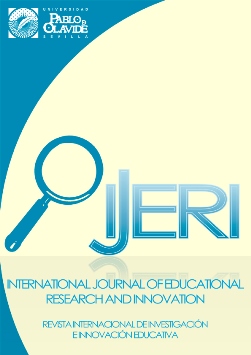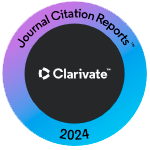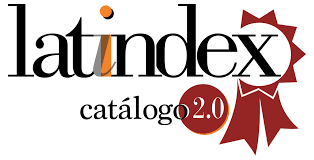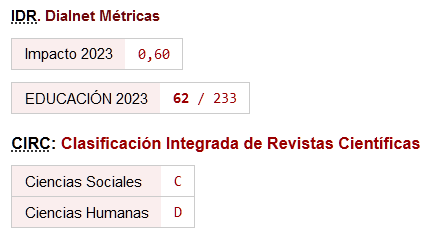The role of social relations in the making of a doctoral thesis
Palabras clave:
dissertation writing, doctoral education, familial support, institutional supportResumen
Writing a doctoral thesis is a challenging process for most doctoral students. From a situated learning perspective, it involves more than just internalizing some objective knowledge about language, but entails developing an identity through participation and transformation of disciplinary communities of practice. Several works have analyzed the function that social relationships from the academic realm play in the dissertation process, paying special attention to the supervisor/candidate dyad. However, research on domestic or personal ties is rather scarce. This qualitative study explores if and how social ties from the personal sphere influence in a positive way the dissertation writing process. Analysis of in-depth interviews, with students and recent graduates from different Argentine PhD programs in the field of Linguistics and Education, indicate that these social relations do facilitate different types of support. These results can inform institutional initiatives to scaffold the dissertation research and writing process and thus improve the support offered to doctoral students from the academic realm.
Descargas
Citas
Aitchison, C. (2003). Thesis writing circles. Hong Kong Journal of Applied Linguistics, 8(2), 97-115.
Aitchison, C., & Lee, A. (2006). Research writing: Problems and pedagogies. Teaching in Higher Education, 11(3), 265-278.
Angelova, M., & Riazantseva, A. (1999). "If you don't tell me, how can I know?": A case study of four international students learning to write the US way. Written Communication, 16(4), 491-535.
Barnacle, R., & Mewburn, I. (2010). Learning networks and the journey of 'becoming doctor'. Studies in Higher Education, 35(4), 433-444.
Barsky, O., & Dávila, M. (2004). Las tendencias actuales de los posgrados en Argentina. Documento de Trabajo No. 117, Buenos Aires: Universidad de Belgrano.
Barton, D., & Hamilton, M. (1998). Local literacies: Reading and writing in one community. New York: Routledge.
Bazerman, C., & Prior, P. A. (Eds.). (2004). What writing does and how it does it : An introduction to analyzing texts and textual practices. Mahwah, N.J.: Lawrence Erlbaum Associates.
Belcher, D. (1994). The apprenticeship approach to advanced academic literacy: Graduate students and their mentors. English for Specific Purposes, 13(1), 23-34.
Brunner, J. J., & Ferrada Hurtado, R. (Eds.). (2011). Educación superior en Iberoamérica. Informe 2011. Santiago de Chile: Centro Interuniversitario de Desarrollo (CINDA) - Universia.
Cadman, K. (1997). Thesis writing for international students: A question of identity? English for Specific Purposes, 16, 3-14.
Caffarella, R. S., & Barnett, B. G. (2000). Teaching doctoral students to become scholarly writers: The importance of giving and receiving critiques. Studies in Higher Education, 25(1), 39-52.
Carlino, P. (2003). La experiencia de escribir una tesis: Contextos que la vuelven más difícil. Anales del Instituto de Lingüística (Universidad de Cuyo, Argentina), 25, 41-62.
Carlino, P. (2004a). El proceso de escritura académica: Cuatro dificultades de la enseñanza universitaria. Educere, 8(26), 321-327.
Carlino, P. (2004b). Enfoque contrastivo para estudiar las culturas académicas: la supervisión de tesis de posgrado en Argentina y en Australia. Paper presented at the Memorias de las XI Jornadas de Investigación en Psicología. Facultad de Psicología de la Universidad de Buenos Aires. 29-30 de julio de 2004, Tomo I pp. 169-173.
Carlino, P. (2005). ¿Por qué no se completan las tesis en los posgrados? Obstáculos percibidos por maestrandos en curso y magistri exitosos. Educere, 9(30), 415-420.
Carlino, P. (2008, September). Desafíos para hacer una tesis de posgrado y dispositivos institucionales que favorecerían su completamiento. Paper presented at the Segundo Encuentro Nacional y Primero Internacional sobre Lectura y Escritura en Educación Superior, Bogotá, Colombia.
Carlino, P. (2011). Writing in research education. Working with discourse and identity challenges faced by doctoral students. Paper presented at the Writing Research Across Borders II International Conference, George Mason University, Washington D.C., February 17-20. Retrieved January, 25, 2010, from http://www.writing.ucsb.edu/wrconf11/SessionL.pdf
Carlino, P. (2012). Helping doctoral students of Education to face writing and emotional challenges in identity transition. In M. Castelló & C. Donahue (Eds.), University writing: Selves and texts in academic societies (Vol. 24, pp. 217-234). Bingley: Emerald Group Publishing Limited.
Casanave, C. P. (1995). Local interactions: Constructing contexts for composing in a graduate sociology program. In D. Belcher & G. Braine (Eds.), Academic writing in a second language: Essays on research and pedagogy (pp. 83-110). Norwood, NJ: Ablex Publishing Corporation.
Chihota, M. C. (2007). 'The games people play': Taking on postgraduate identities in the context of writer circles. Journal of Applied Linguistics, 4(1), 131-136.
Colombo, L. M. (2011). Writing resources used by graduate international students and their effect on academic satisfaction. (Doctoral dissertation, University of Maryland, Baltimore County, 2011). ProQuest Dissertations and Theses, 276.
Colombo, L. (2012a). Escritura de posgrado y aprendizaje situado. In Facultad de Psicología de la Universidad de Buenos Aires (Ed.), Memorias del IV Congreso Internacional de Investigación y Práctica Profesional en Psicología - XIX Jornadas de Investigación - VIII Encuentro de Investigadores en Psicología del MERCOSUR. Vol. 1 (pp. 82-85). Buenos Aires: Ediciones de la Facultad de Psicología - Universidad de Buenos Aires.
Colombo, L. (2012b, August). Grupos de escritura en el posgrado. Paper presented at the VIII Jornadas de Material Didáctico y Experiencias Innovadoras en Educación Superior, Buenos Aires, Argentina. Retrieved June, 22, 2013 from http://www.biomilenio.net/biomilenio/index.html.
Colombo, L., & Carlino, P. (2015). Grupos para el desarrollo de la escritura científico-académica: Una revisión de trabajos anglosajones. Lenguaje, 43(1), 13-34. Disponible en http://revistalenguaje.univalle.edu.co/index.php/Lenguaje/article/view/3276.
Creswell, J. W. (2007). Qualitative inquiry & research design: Choosing among five approaches (2nd ed.). Thousand Oaks: Sage Publications.
De la Fare, M., & Lenz, S. (2012). El posgrado en el campo universitario: Estudio de la expansión de carreras y exploraciones sobre la productividad de tesis en la Argentina. Buenos Aires: Instituto de Estudios y Capacitación/Universidad Nacional de General Sarmiento.
Deem, R., & Brehony, K. J. (2000). Doctoral students' access to research cultures--are some more unequal than others? Studies in Higher Education, 25(2), 149-165.
Dysthe, O. (2002). Professors as mediators of academic text cultures: An interview study with advisors and Master's degree students in three disciplines in a Norwegian university. Written Communication, 19(4), 493-544.
Dysthe, O., Samara, A., & Westrheim, K. (2006). Multivoiced supervision of Master's students: A case study of alternative supervision practices in higher education. Studies in Higher Education, 31(3), 299-318.
Ferenz, O. (2005). EFL writers' social networks: Impact on advanced academic literacy development. Journal of English for Academic Purposes, 4, 339-351.
Ivanič, R. (1998). Writing and identity: The discoursal construction of identity in academic writing (Vol. 5): John Benjamins.
Jeppesen, C., Nelson, A., & Guerrini, V. (2004). Diagnóstico y perspectiva de los estudios de posgrado en Argentina. Buenos Aires: IESAL/UNESCO - Secretaría de Políticas Universitarias/Ministerio de Educación, Ciencia y Tecnología de la República Argentina.
Lave, J., & Wenger, E. (1991). Situated learning: Legitimate peripheral participation. New York: Cambridge University Press.
Lofland, J., Snow, D., Anderson, L., & Lofland, L. H. (2006). Analyzing social settings: A guide to qualitative observation and analysis (4th ed.). Belmont, CA: Wadsworth.
Martín Torres, G. G. (2012). La escritura de tesis de posgrado en el área de investigación educativa: El acompañamiento, una pieza clave. CPU-E Revista de Investigación Educativa, 15, 69-86.
Maxwell, J. A., & Miller, B. (2008). Categorizing and connecting strategies in qualitative data analysis. In S. Hesse-Biber & P. Leavy (Eds.), Handbook of emergent methods (pp. 461-477). New York: The Guilford Press
McAlpine, L. (2013). Doctoral supervision: Not an individual but a collective institutional responsibility. Infancia y Aprendizaje, 36(3), 259-280.
McAlpine, L., & Amundsen, C. (2012). Challenging the taken-for-granted: how research analysis might inform pedagogical practices and institutional policies related to doctoral education. Studies in Higher Education, 37(6), 683-694.
McAlpine, L., Paulson, J., Gonsalves, A., & Jazvac-Martek, M. (2012). 'Untold' doctoral stories: can we move beyond cultural narratives of neglect? Higher Education Research & Development, 31(4), 511-523.
Prior, P. A. (1997). Literate Activity and Disciplinarity: The Heterogeneous (Re) production of American Studies Around a Graduate Seminar. Mind, Culture, and Activity, 4(4), 275-295.
Prior, P. A. (1998). Writing/disciplinarity: A sociohistoric account of literate activity in the academy. Mahwah, N.J.: Lawrence Erlbaum Associates.
Reisin, S., & Carlino, P. (2009, August). Factores que favorecen u obstaculizan la finalización de una maestría en ciencias sociales. El punto de vista de los involucrados. Paper presented at the I Congreso Internacional de Investigación y Práctica Profesional en Psicología - XVI Jornadas de Investigación - Quinto Encuentro de Investigadores en Psicología del MERCOSUR. Retrieved February, 18, 2011, from https://sites.google.com/site/jornadasgiceolem/posgrado.
Russell, D. R. (1995). Activity theory and its implications for writing instruction. In J. Petraglia (Ed.), Reconceiving Writing, Rethinking Writing Instruction (pp. 51-78). Mahwah, NJ: Lawrence Erlbaum Associates.
Seloni, L. (2011). Academic literacy socialization of first year doctoral students in US: A micro-ethnographic perspective. English for Specific Purposes, 31(1), 47-59.
Shaw, P. (1991). Science research students’ composing processes. English for Specific Purposes, 10(3), 189-206.
Styles, I., & Radloff, A. (2000). Jabba the Hut: Research students' feelings about doing a thesis. In A. Herrmann & M. M. Kulski (Eds.), Flexible Futures in Tertiary Teaching. Proceedings of the 9th Annual Teaching Learning Forum, 2-4 February 2000. Perth: Curtin University of Technology. Retrieved June, 30, 2012, from http://otl.curtin.edu.au/professional_development/conferences/tlf/tlf2000/styles.html.
Wenger, E. (1998). Communities of practice: Learning, meaning, and identity. New York: Cambridge University Press.
Yates, B. (2007). Integrating doctoral candidates into research teams. In C. Denholm & T. Evans (Eds.), Supervising doctorates downunder: Keys to effective supervision in Australia and New Zealand (pp. 105-112). Victoria: Acer Press.











